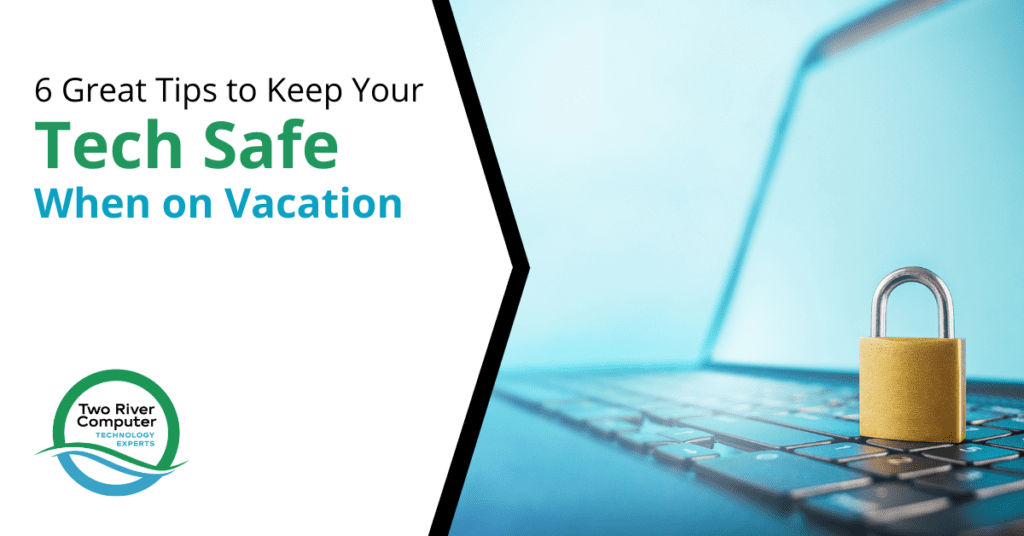
The summer of 2021 is going to be a banner one for family vacations. Most people are itching to get back out in the world after a long pandemic and over a year of canceled plans.
The vaccine rollout has resulted in airlines, national parks, and other tourist industry businesses reporting more visitors than they’ve seen in a long time.
If you’re planning a beach vacation with some summer reading, an exciting trip to a faraway destination, or any other family adventure, there’s a good chance that you’re taking electronics with you.
When you’re on vacation, your data and devices need more scrutiny. You don’t just want to connect to any free Wi-Fi and log into online banking, which would be a big identity theft risk.
1/3 of employees admit to taking their work computer with them on vacation.
People often access all types of sensitive data on their laptops and mobile devices while on vacation. This includes social media accounts, business cloud accounts, online banking, email, and more.
Before you head on vacation this summer, you’ll want to go through our checklist of tips for keeping your tech and your data secure while you enjoy your time away.
Use a VPN When You Connect to Any Wi-Fi
At least 45% of people will go online while at the airport, and 50% are connected by the time they get to their hotel. “How do I get on Wi-Fi” is often one of the first questions families ask when checking in.
Public Wi-Fi, even at a hotel, can be a big risk. There could be a hacker also connected to that same free Wi-Fi using hacking software to spy on the activities of others.
You always have to assume someone is peering over your shoulder when you’re on a public hot spot. While never entering a password or credit card number (or any other personal data) into electronic devices when on free Wi-Fi is a best practice, it’s not very practical for most people.
You can secure and encrypt all your online connections through the use of a VPN when on vacation. Getting a VPN subscription is a low cost (usually less than $5/month). You can have your entire family download and enable the VPN on their devices and ensure no one is going to have their internet activities spied on or passwords stolen.
Use Remote Find/Lock My Device Software
We’re relaxed while on vacation and it’s tempting to leave your laptop at the table for a second while grabbing a napkin at the airport food court. But it only takes a second for a device to be stolen.
Make sure you have the find/lock my device feature that most operating systems offer enabled. This ensures you can keep your confidential information from being accessed by a thief that’s just stolen your iPad or laptop.
Turn Off Device Sharing Features
Many people have sharing enabled on their devices so they can easily connect and share data through a home or office network. This feature should be turned off when on vacation.
You don’t want to invite any strangers to get into your system, and even if the folder you’re sharing doesn’t have anything sensitive, a hacker can use the sharing feature to get into other areas of your hard drive.
Keep Devices With You (Don’t Put in Checked Bags)
Your devices not only have data on the hard drive but are also often logged into various sites and cloud apps. Users often save their passwords in the browser so they will autofill. This makes a thief’s job even easier.
Don’t check any of your electronics (computers, tablets, smartphones) in your luggage, because it can get stolen. Instead, keep them with you in the carry-ons you bring on the plane.
Back-Up All Your Data Before You Go
If a device is lost, stolen, or damaged while on vacation, you don’t want the loss to include all your files as well as your device. Back up all your data to a secured backup and recovery solution before you go as a data insurance policy. You can contact our New Oxford office for more information and also to know more about other options available in this field.
Don’t Charge Your Device in an Unfamiliar Place
There is a scam that is often done in tourist areas called “juice jacking.” This is when a hacker sets up a fake outlet kiosk for people to charge their devices. People often use USB chargers, which are not just for power, but also data. These juice jacking setups are designed to steal all the data on any connected device.
Only charge in trusted spots, like your hotel room. It’s also wise to only use Wi-Fi that you know is legitimate, such as Starbucks Wi-Fi or official airport Wi-Fi. If in doubt, use your mobile data plan to get online.
Are Your Devices Secure & Up To Date?
You should also ensure you have good device security (antivirus, DNS filtering, etc.) before you leave on your trip. Two River Computer can help your family with a device security check before you go!
Contact us today for a free consultation. Call 732-747-0020 or reach us online.


